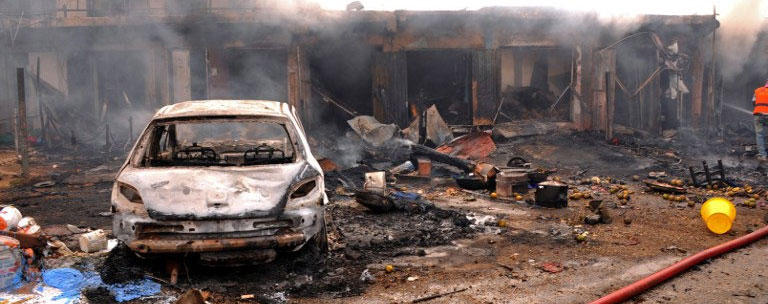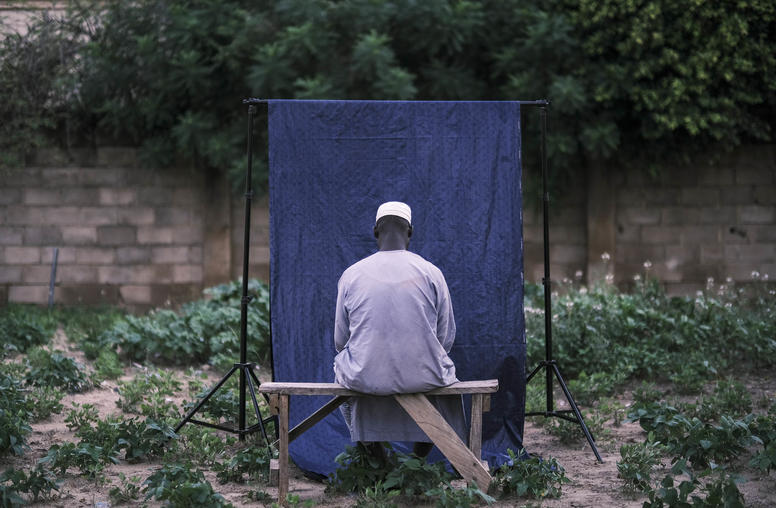Nigeria’s Double-Edged Front-Line
Vigilantes have become vital in the country's fight against Boko Haram. But is there a way to ensure they're not also making things worse?

This past May, the Nigerian city of Jos, which lies along the country’s “middle belt,” where the majority-Muslim north meets the largely Christian south, was rocked by back-to-back car bombings that killed at least 118 people. The first struck a bustling market and the second, some 30 minutes later, targeted a nearby hospital. Though it had long been the site of inter-religious violence, Jos, a city of almost 1 million people, had recently fallen into sights of the militant Islamist group Boko Haram, which carried out the bombings. The event thrust Jos into Nigeria’s escalating, years-long war against an insurgency that has killed an estimated 1,500 in 2014 alone, according to Amnesty International.
Still, the bloody toll of terrorism in Jos could have been worse. Shortly before a planned attack on a soccer match that might have killed hundreds, local vigilantes are said to have found and apprehended a would-be suicide bomber. Jos was spared another deadly blow.
The story of the vigilantes’ successful intervention was relayed to me by women who had led a march in early May to protest the kidnapping of more than 200 girls by Boko Haram in April. Though it seems, at first, a rare bit of good news in the conflict, it also elucidates a persistent issue for Nigeria: Vigilante action is a controversial but common measure to counter Boko Haram — and one that may complicate efforts to find a longer-term solution to extremist violence in the country.
The term “vigilante” covers a broad spectrum of informal security actors, from paramilitaries to private security firms to voluntary police forces. Vigilantes have been regular fixtures in Nigeria since the pre-colonial era. Against the backdrop of often disempowered, under-resourced police struggling with corruption and politicization, tribal or voluntary police units and other informal security actors have emerged as first-line responders to terrorism and violence. They are examples of how communities fend for themselves, and they often offer protection and security that state forces have failed to provide. The Jos incident is one of a string of successes attributed to vigilantes. Last month in Nigeria’s northeast, vigilantes reportedly helped the national army drive Boko Haram out of the town of Mubi, and paramilitaries also are credited with helping expel the insurgent group from its one-time base in Maiduguri earlier this year.
But informal security enforcers bring with them their own set of problems — which often overlap with the very ones they are combating. Vigilantes are often no less abusive and no more competent than government forces, and they may be even more difficult to rein in because they can be even less accountable than the police or military to the local communities where they operate. Because different vigilante groups are often managed by rival political interests, their presence — especially as national elections approach next year — may actually contribute to violence.
In the northeast in particular, there has been documentation of human rights abuses committed by vigilantes fighting Boko Haram. “From witnesses and victims and families of victims that we have talked to, there is an undeniable degree of frustration and concern and fear against the vigilante groups,” Netsanet Belay, the Africa director of research and advocacy at Amnesty International, told the New York Times Magazine for a feature article on vigilantes published in November.
On a longer-term basis, vigilantes pose another quandary: Can society groups and local officials bring them into the fold for an enduring security strategy? More specifically, can they be convinced to participate in what is known as community policing?
Community policing is both a philosophy and an organizational strategy for promoting collaboration between the police and a community in order to ensure safety and security. Western aid organizations have looked for ways to apply the concept in societies undergoing transitions or emerging from conflict for the last 20 years, as outlined in a September U.S. Institute of Peace special report, “Inclusive Approaches to Community Policing and CVE.” But the idea has caught fire particularly in recent years as a strategy to prevent terrorism and violent extremism. In the aftermath of 9/11, community policing became the go-to strategy in America and Britain for improving communication between police authorities and populations, and hopefully for preventing future attacks.
The success of any community-policing effort depends largely on trust between a state’s formal institutions and its citizens, and on a common understanding between both sides of what constitutes violent extremism. By extension, the sides also agree on what makes for an effective response to that extremism. These common standards are difficult enough to agree on in a society that’s relatively secure — even more so in a country living with an insurgency.Â
Community policing is a particularly promising solution in Nigeria, where the civilian population sharing of local knowledge has proven a powerful tool for detecting and preventing crime and violence. But government forces must first build the trust necessary to pull it off.
The Nigerian government and its police and military have struggled to do just that. Too often, police response to security threats is delayed or ineffective, and other times their heavy handed policing approaches exacerbates the country’s cycle of violence. Many civilians are wary that police are merely collecting information for their own purposes and not with the aim of shared community security. The colonial legacy of authoritarian, centralized police institutions, designed to repress nationalist movements rather than serve the populace, only multiplies this distrust. The existence of vigilantes, so far, is only further complicating efforts to reform the police and enhance its relationships with communities.
There have been some bright spots of progress. Local police in Jos, for instance, have had success organizing community outreach efforts, including town hall style meetings with police and local civil society, tribal, and religious leaders. Bringing vigilantes into community policing efforts could be one more step in extending that trust, and one that could hopefully temper some of the problems the groups present. Vigilantes have filled a void in providing much needed response to the escalating violence in Nigeria, acting as a first and sometimes only line of defense. But often they function as a stopgap, not a solution — from the volunteer police services in Jos to the paramilitaries in the northeast, they can create as many problems as they solve. Incorporating vigilantes into hybrid community policing models may be one way to ensure some accountability and oversight. Ultimately, vigilantes must work in collaboration with the security services whose mandate is to serve and protect the people of Nigeria.
Reposted with permission from ForeignPolicy.com, Source: “Nigeria’s Double-Edged Front Line"



